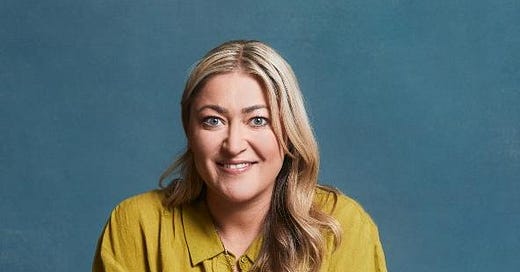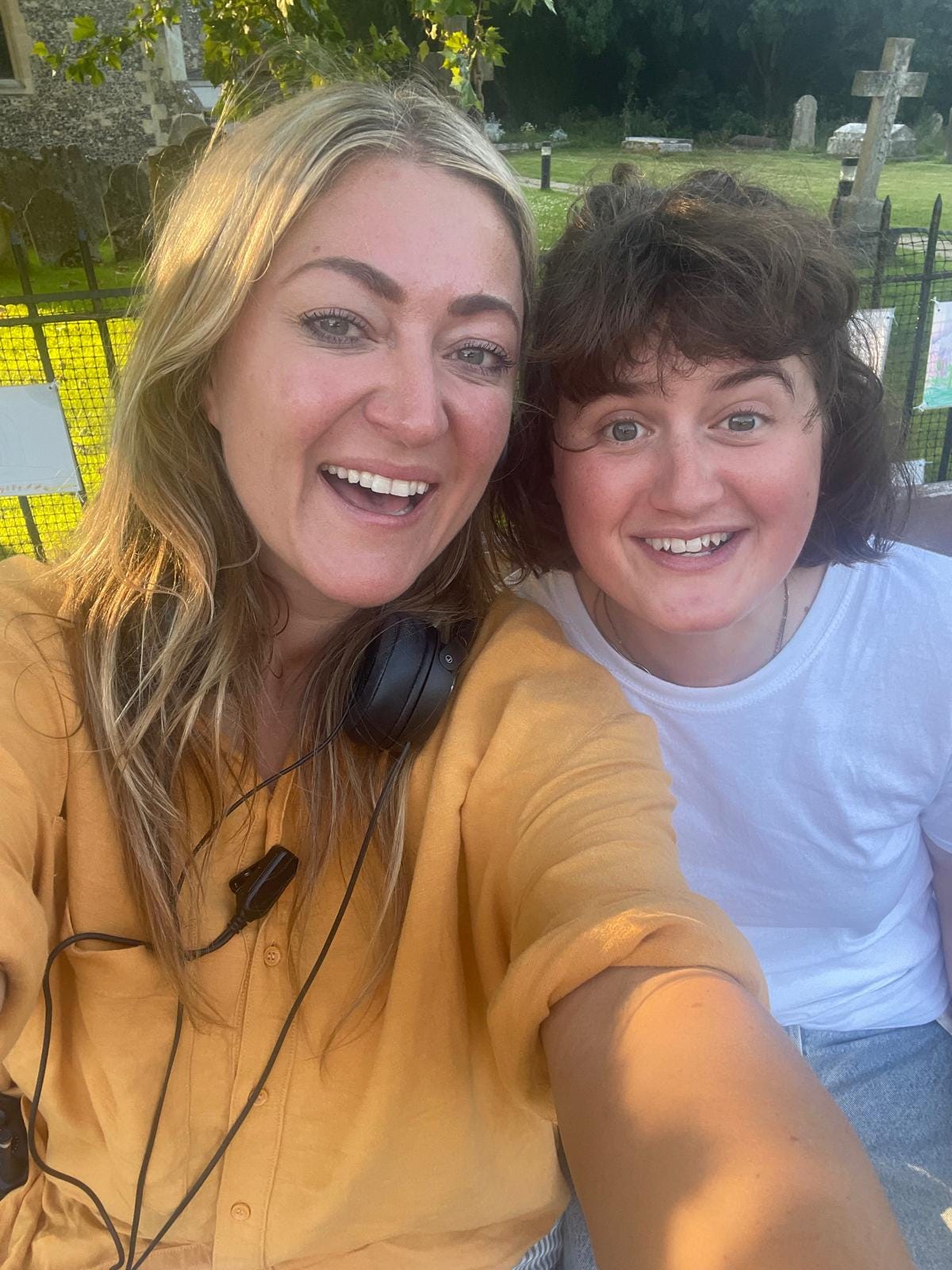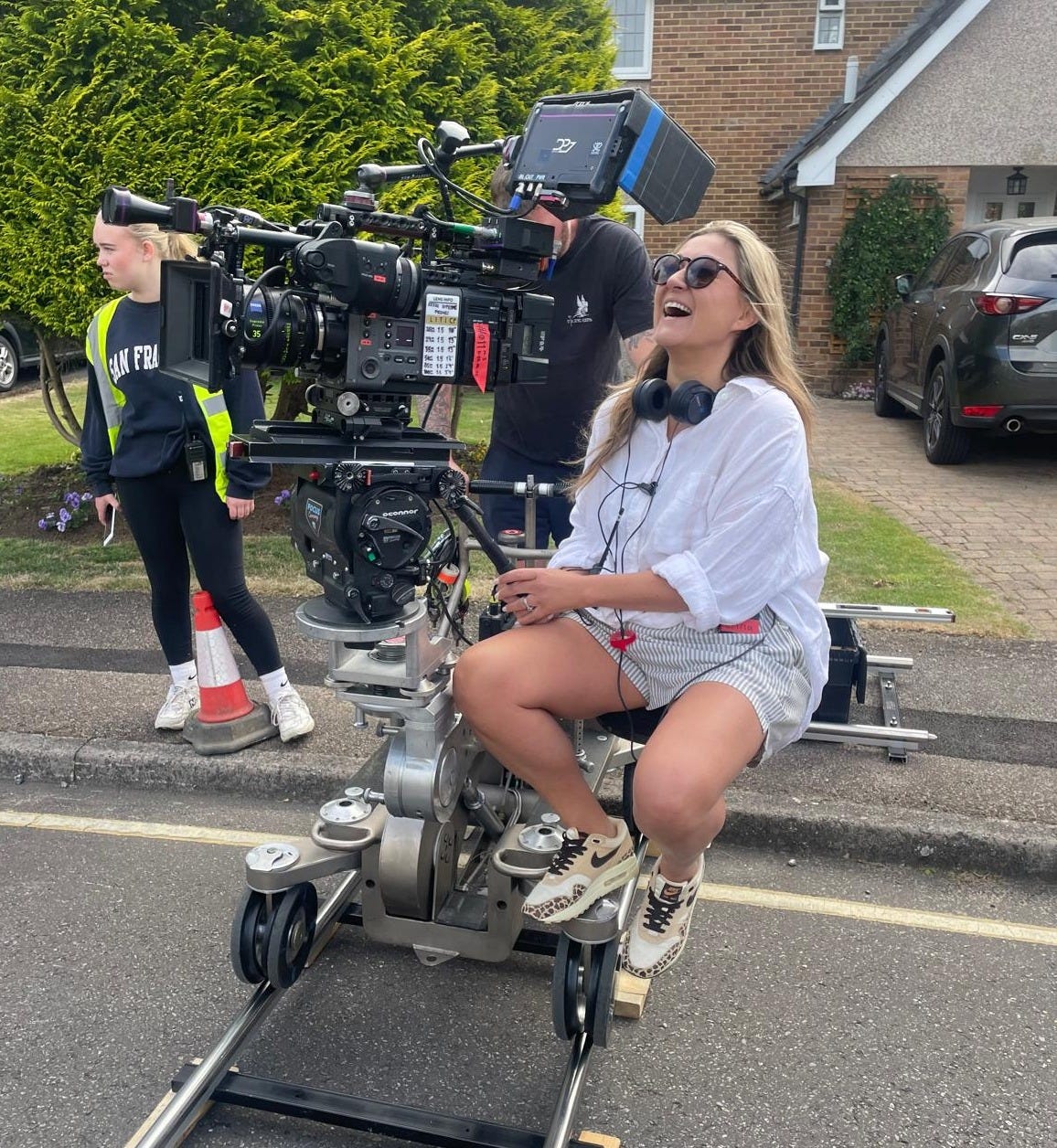Broadcasting: Gina Lyons
TV & Film Producer Gina Lyons discusses the challenges of being a working-class woman in TV, the power of comedy in processing trauma, and her mission to champion underrepresented voices.
Last week, I was chatting to my dad about something that happened at work (nothing dodgy - that happens all the time in TV!) and I was like, “In ALL MY YEARS, this has never happened to me before, can you believe it?”. He looked at me and laughed: “What, in all your eight years of work? Come back to me when you’re my age!” He was right. We think we’re old when we’re thirty, the same way we think we’ve lived a life when we’re crying over Patrick at our year six leavers’ disco (but why doesn’t he fancy ME???). It was humbling.
But, if you’ll forgive the self-indulgence, there is a point here that pertains to this week’s guest - Gina Lyons. Gina actually has done loads, earning her the right to possess a certain nostalgia when she reflects on her work. I realise that makes it sound like she is old. She is not. But she has had an illustrious career, starting with her win on Channel 4’s Get Me The Producer competition in 2007. Since then, she produced the pilots for In My Skin and Dreaming Whilst Black, associate-produced Breeders, series-produced Dinner With The Parents AND started her own production company, Gobby Girl productions. She recently wrapped on her first feature Go Away!, starring Hugh Bonneville and Ella Bruccoleri. An advocate for working-class voices, Gina was selected for the Edinburgh TV Festival Foundation’s class and social equality group in 2024. Like me, Gina started in unscripted TV, and I love her refreshing perspective on storytelling across genres. We discuss comedy as a coping mechanism for trauma (TW grief and substance abuse), feeling unable to be your authentic self, and the need for transparency within the industry.
“We need so much more transparency on what it takes to survive in this industry, particularly if you’re from a marginalised background, have dependents and aren’t rich. But no-one talks about how hard it is.”
In a country where most independent production companies seem to be named after an animal, an element, a place, a word which is synonymous with being bold or distinctive (but not those words because they are TOO OBVIOUS), or a variation of the above, Gobby Girl Productions feels like a breath of fresh air. Tell us where the name came from.
About ten years ago, I was at Casey Batchelor’s birthday party after working on a show with her. Jim Davidson was there, fresh from his debut Edinburgh Fringe show. I was intrigued - what the hell was this guy, with all his questionable opinions, doing at the Fringe?! I went up to him and introduced myself as a comedy producer and he was like, “what do they do then?”, turned his back on me and started chatting to a bloke. He seemed like he hated me! I went back (after a few more wines) and told him I’d grown up watching him on TV, but I mixed up the shows and said Bullseye instead of Big Break. This riled him up more and he said he knew there was a reason he didn’t like me.
I was upset (chronic people pleaser), and when I told my then-boyfriend about it we discovered that Jim had tweeted about me: “Casey’s party was a hoot. Why is there always one pissed gobby woman?” At the time, I was writing for Huffington Post, so I blogged about it. Jim ended up re-tweeting my post. Thanks, Jim. Years later, when I was thinking about starting my own production company, my husband was like, you should call it Gobby Woman! And I thought, better yet, I’m going to call it Gobby Girl, reclaiming the word for all the working-class women who’ve been called gobby. There is so much sexism in TV, but it’s even worse if you’re from a working class background. I used to try and hide it. I’d be sat in a room of posh white men, eating my crackers and hummus and thinking, I’ve nailed this - no-one has a clue!
When did you first feel like your class was something you needed to ‘hide’?
It definitely correlated with working in TV. I was living at home in Northampton and working in a nightclub when I saw an advert in a magazine for a Channel 4 show called Get Me The Producer. I didn’t get into the final twelve initially, but then someone dropped out and they called me. We had to put ourselves up in London for the whole two months of filming. I was living in this weird flat in Pimlico with a nudist and a paparazzi with a penchant for taking up-the-skirt shots of celebs. I remember at the time you’d buy a ticket for the bus and they’d give you a little printout. I scratched the date off and used the same ticket for the entire production! All I would eat was what they fed us on set. I didn’t tell anyone, so I must have had an awareness, conscious or not, that my background was something I should hide.
I ended up winning that show, which kickstarted my career as a producer, but that feeling of being different only grew as I started climbing the ladder. The TV industry is full of people from middle-upper class backgrounds, mostly men, and it was worse back then. Almost everyone I was working with had had a private education and then gone on to university, but going to uni wasn’t something that anyone in my family had done. I guess hiding my background was a bit of a survival mechanism.
We tell people to be their authentic selves, but it’s much easier to do that when that self is an ‘acceptable’ one! At Gobby Girl, there is an emphasis on underrepresented voices, but particularly those in comedy. Do you find comedy a useful way to express underrepresented perspectives?
Yes, underrepresented perspectives, but also difficult ones. Humour has always been a coping mechanism for me. Growing up, I went through a lot of trauma. I came from a poor-ish, but very loving family. There was me, my mum, dad and two brothers. When I was six, one of my brothers got appendicitis and ended up on life support for three months. We thought he was going to die. The priest even came and my mum told him to fuck off because she refused to say bye! He was in hospital for over a year. Then, when I was twelve, my dad had an affair with my mum’s best friend. It was quite a public thing, very well known in Northampton. My mum really struggled and turned to alcohol after that. I’d get phone calls telling me that she was passed out in the street. It was pretty turbulent. And then, when I was seventeen, my other brother died in a car crash. When I think back to that time, I remember trauma, but I also remember laughter. At my brother’s funeral, things just kept going wrong that we thought were hilarious. The priest kept calling him Gary even though his name was Gavin. Two minutes later he would do it again. We couldn’t stop laughing. Everyone was staring at us like we were nuts! But I think we had to laugh to get through it.
My mum is sober now. She took an overdose two months before my wedding and we put her in rehab. I’ve written a script about her and Gavin with my brilliant friend and amazing writer Taylor Glenn. It’s about grief. I think about grief a lot and how it’s a process, a thing you have to go through rather than any other way. I grew up watching The Young Ones, Ab Fab, and The Vicar of Dibley, but my absolute favourite shows are ones where there is a gut-wrenching sad moment followed by a hilarious scene. That’s life.
I agree. Storytelling is such a powerful tool in helping us understand the human experience, which is why we need more variety in terms of who gets to tell their story. Otherwise we’re only getting access to such limited perspectives. You’re one of the few producers I know who, like me, started off working in unscripted telly before moving over to scripted. When I made that transition, I was met with a lot of snobbery. Was that your experience?
Yes! It took me four years to actually get work in scripted. I produced a bunch of shorts and then did a non-tx pilot called Waiting for Gadot with Richard Gadd. For about two years after that, I sent Nerys Evans at Expectation my CV every single month, until eventually she told me about this pilot that working-class writer Kayleigh Llewellyn had written. That was In My Skin. It took me eighteen months after that to get another pilot.
There’s definitely a snobbery in the UK between genres; people who work in scripted look down on unscripted like it’s a naughty little sister. Having done both, I can confidently say that people in unscripted have it way harder! You’ll understand this - in unscripted, you earn way less but have to do so much more, whereas in scripted it feels like there are people for everything. When I was working on entertainment and panel shows, I was doing it all. I was writing the jokes, booking the extras, buying the costumes, but now I find myself overseeing a lot more. I think some of the best writers and producers in comedy started off in unscripted. It’s a skill to make content on a daily or weekly basis with really small budgets. Same for digital. I have a lot of respect for storytelling, regardless of the genre, but the thing with scripted is that it lives. Unscripted goes out and that tends to be it.
Your career has been incredibly varied, which - as someone who has also jumped around across genres and been told to “commit and just stay in my lane” - is very inspiring. How much of that was deliberate and how much of it was necessity?
A lot of it is survival. An advert a year has saved my life. I did an internal commercial for a bank last year and it saved Christmas. I have two or three different CVs that I alternate between depending on what the job is. People are complimentary about my CV, but they haven’t seen the holes. I’ve done all sorts. I booked Caitlyn Jenner on MTV cribs. During Covid, I worked for Facebook and did casting. I made the comedy content for Beano for a while.
We need so much more transparency on what it takes to survive in this industry, particularly if you’re from a marginalised background, have dependents and aren’t rich. But no-one talks about how hard it is. We need to be more open about what it really takes to get by, but instead there’s this narrative that we should feel ‘lucky’. We work really hard and give up so much. I went back to work when my daughter Ettie was only four weeks old after my husband lost his job. When I’m on set, I miss bath and bedtime for months. We don’t get pensions, we have massive loans. I love my job so much, but it is still that - a job.
Looking ahead, what are your hopes for Gobby Girl?
My dream is that Gobby Girl is a small but busy production company that produces three or four shows a year. I want to find exciting ways to tell stories that haven’t been told before. I have never seen a family like mine on television and that baffles me because we are so funny! There are so few comedy production companies owned by women, especially those from underrepresented backgrounds. I want Gobby Girl to offer a space where writers can feel seen. When I first announced Gobby Girl on Twitter, I was inundated with writers who were sick of working with the same people again and again. I know there’s a demand for what I’m doing and I already feel proud of work I haven’t even made yet. The next step is to convince those in positions of power to trust me and part ways with their money! I’ll always keep trying. The only way to guarantee failure is to quit.






